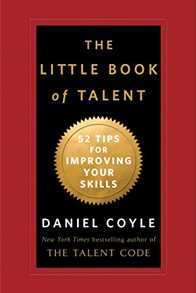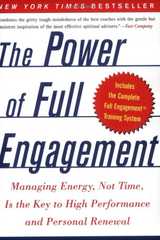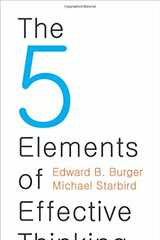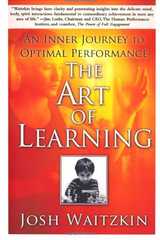
The Little Book of Talent: 52 Tips for Improving Your Skills
byDaniel Coyle
"Grit is that mix of passion, perseverance, and self-discipline that keeps us moving forward in spite of obstacles." If you want to get better at getting better, The Little Book of Talent is a good start. This was a very fun read. I felt so excited to implement a good portion of the tips from the book of talent. It's jam packed full of wisdom and I see myself referencing this book repeatedly.
Motivations to Read
As a lifelong learner, cultivating new skills efficiently would allow me to explore crafts on a deeper level in the same or less time and probably fit in more skills.
3 Reasons to Read
- You want a better way to improve your skills and habits.
- Deeper understanding of the underlying neuroscience behind skill building.
- Improve athletic or artistic performance, two areas covered a bit in the book.
The Little Book of Talent: 52 Tips for Improving Your Skills Notes & Summary
The tips fall into 3 categories:
- Getting Started: ideas for igniting motivation and creating a blueprint for the skills you want to build.
- Improving Skills: methods and techniques for making the most progress in the least time.
- Sustaining Progress: strategies
"Small actions, repeated over time, transform us. As the master vocal coach Linda Septien put it, "This ain't magic, and it ain't rocket science. It's about working hard, and working smart.""
Getting Started
Stare, Steal and Be Willing to Be Stupid
Tip 1: Stare at Who You Want to Become
"Think of your windshield as an energy source for your brain. Use pictures (the walls of many talent hotbeds are cluttered with photos and posters of their stars) or, better, video. One idea: Bookmark a few YouTube videos, and watch them before you practice, or at night before you go to bed."
Tip 2: Spend Fifteen Minutes A Day Engraving The Skill On Your Brain
Imagine the feeling of performing the skill. Project yourself into the performers body. Go through the decision making processes to execute the skill.
Tip 3: Steal Without Apology
"All improvement is about absorbing and applying new information, and the best source of information is top performers. So steal it."
"When you steal, focus on specifics, not general impressions. Capture concrete facts.."
Tip 4: Buy A Notebook
"A notebook works like a map: It creates clarity."
Tip 5: Be Willing To Be Stupid
"But being willing to be stupid- in other words, being willing to risk the emotional pain of making mistakes- is absolutely essential, because reaching, failing, and reaching again is the way your brain grows and forms new connections."
Tip 6: Choose Spartan Over Luxurious
"Simple, humble spaces help focus attention on the deep-practice task at hand: reaching and repeating and struggling. When given the choice between luxurious and spartan, choose spartan. Your unconscious mind will thank you."
Tip 7: Before You Start, Figure Out If It's A Hard Skill Or Soft Skill
"Hard skills are about repeatable precision, and tend to be found in specialized pursuits, particularly physical ones."
"Soft skills are about the three Rs: Reading, Recognizing, and Reacting."
Tip 8: To Build Hard Skills, Work Like A Careful Carpenter
"To develop reliable hard skills, you need to connect the right wires in your brain. In this, it helps to be careful, slow, and keenly attuned to errors. To work like a careful carpenter."
Tip 9: To Build Soft Skills, Play Like A Skateboarder
"Soft skills are built by playing and exploring inside challenging, ever-changing environments.[..] In other words, to build soft skills you should behave less like a careful carpenter and more like a skateboarder in a skateboard park: aggressive, curious, and experimental, always seeking new ways to challenge yourself."
"When you practice a soft skill, focus on making a high number of varied reps, and on getting clear feedback. Don't worry too much about making errors- the important thing is to explore. Soft skills are often more fun to practice, but they're also tougher because they demand that you coach yourself. After each session ask yourself, What worked? What didn't? And why?"
🌟 Tip 10: Honor The Hard Skills
"Most talents are a combination of soft and hard skills. Prioritize the hard skills because in the long run they're more important to your talent."
"One way to keep this idea in mind is to picture your talent as a big oak tree- a massive, thick trunk of hard skills with a towering canopy of flexible soft skills up above. First build the trunk. Then work on the branches."
Remark: Hard skills usually take more energy and time to develop, so that is where I also try to put most of my focus on in small increments over time. The soft skills are still important but you have more wiggle room for developing them whereas hard skills need more deliberate practice.
Tip 11: Don't Fall For The Prodigy Myth
"If you have early success, do your best to ignore the praise and keep pushing yourself to the edges of your ability, where improvement happens. If you don't have early success, don't quit. Instead, treat your early efforts as experiments, not as verdicts. Remember, this is a marathon, not a sprint."
🌟 Tip 12: Five Ways To Pick A High Quality Teacher Or Coach
- Avoid Someone Who Reminds You of a Courteous Waiter
- Seek Someone Who Scares You a Little. Look for someone who: Watches you closely, is action-oriented, and is honest, sometimes unnervingly so.
- Seek Someone Who Gives Short, Clear Directions
- Seek Someone Who Loves Teaching Fundamentals
- Other Things Being Equal, Pick the Older Person
Remark: Finding mentors and teachers can be a hard but very important task. I found this tip helpful and it can serve as a good checklist for better consistency in finding guidance from another person.
Improving Skills
Find the Sweet Spot, Then Reach
"The key to deep practice is to reach. This means to stretch yourself slightly beyond your current ability, spending time in the zone of difficulty called the sweet spot. It means embracing the power of repetition, so the action becomes fast and automatic. It means creating a practice space that enables you to reach and repeat, stay engaged, and improve your skills over time."
Tip 13: Find The Sweet Spot
[Comfort Zone] Sensations: Ease, effortlessness. You're working, but not reaching or struggling. Percentage of Successful Attempts: 80 percent and above.
[Sweet Spot] Sensations: Frustration, difficulty, alertness to errors. You're fully engaged in an intense struggle- as if you're stretching with all your might for a nearly unreachable goal, brushing it with your fingertips, then reaching again. Percentage of Successful Attempts: 50- 80 percent.
[Survival Zone] Sensations: Confusion, desperation. You're overmatched: scrambling, thrashing, and guessing. You guess right sometimes, but it's mostly luck.
Percentage ofSuccessful Attempts: Below 50 percent.
Tip 14: Take Off Your Watch
"Deep practice is not measured in minutes or hours, but in the number of high-quality reaches and repetitions you make- basically, how many new connections you form in your brain. Instead of counting minutes or hours, count reaches and reps."
🌟 Tip 15: Break Every Move Down Into Chunks
"1) What is the smallest single element of this skill that I can master? 2) What other chunks link to that chunk? Practice one chunk by itself until you've mastered it - then connect more chunks, one by one, See the whole thing. Break it down to its simplest elements. Put it back together. Repeat."
Remark: You can increase your success at solving difficult problems or attaining difficult skills by breaking them into smaller easier to manage pieces. When it comes to learning our minds work better dealing with small modules and we can pay attention to those modules and absorb them better.
Tip 16: Each Day, Try To Build One Perfect Chunk
As Wooden also said, "Don't look for the big, quick improvement. Seek the small improvement one day at a time. That's the only way it happens- and when it happens, it lasts."
Tip 17: Embrace Struggle
"Most of us instinctively avoid struggle, because it's uncomfortable. It feels like failure. However, when it comes to developing your talent, struggle isn't an option- it's a biological necessity."
Tip 18: Choose Five Minutes A Day Over An Hour A Week
"With deep practice, small daily practice "snacks" are more effective than once-a-week practice binges. The reason has to do with the way our brains grow- incrementally, a little each day, even as we sleep. Daily practice, even for five minutes, nourishes this process, while more occasional practice forces your brain to play catch-up."
Remark: It is easier to develop habits by starting small. Doing tasks in small intervals lowers the resistance to actually getting the task done and when done over time your results are exponential and more efficient.
Tip 19: Don't Do "Drills". Instead, Play Small, Addictive Games
"Good coaches share a knack for transforming the most mundane activities- especially the most mundane activities- into games."
Tip 20: Practice Alone
"Solo practice works because it's the best way to 1) seek out the sweet spot at the edge of your ability, and 2) develop discipline, because it doesn't depend on others."
Tip 21: Think In Images
"The images are far easier to grasp, recall, and perform. This is because your brain spent millions of years evolving to register images more vividly and memorably than abstract ideas."
🌟 Tip 22: Pay Attention Immediately After You Make A Mistake
"Develop the habit of attending to your errors right away. Don't wince, don't close your eyes; look straight at them and see what really happened, and ask yourself what you can do next to improve. Take mistakes seriously, but never personally."
Remark: This is something that I've had to deal with a lot as I used to be very ashamed of my mistakes and shy away from that. Back in highschool, if I did bad on an exam, that exam was thrown away faster than a criminal trying to get rid of evidence. I did not was to look at my mistakes. Now I am more aware in many aspects of my life to use mistakes as learning opportunities so I can improve and reduce the probability of making the same mistakes down the road.
Tip 23: Visualize The Wires Of Your Brain Forming New Connections
"The more you pay attention to mistakes and fix them, the more of the right connections you'll be building inside your brain. Visualizing this process as it happens helps you reinterpret mistakes as what they actually are: tools for building skill."
Tip 24: Visualize The Wires Of Your Brain Getting Faster
Tip 25: Shrink The Space
"Smaller practice spaces can deepen practice when they are used to increase the number and intensity of the reps and clarify the goal."
Tip 26: Slow It Down (Even Slower Than You Think)
"Super-slow practice works like a magnifying glass: It lets us sense our errors more clearly, and thus fix them."
Tip 27: Close Your Eyes
"Closing your eyes is a swift way to nudge you to the edges of your ability, to get you into your sweet spot. It sweeps away distraction and engages your other senses to provide new feedback. It helps you engrave the blueprint of a task on your brain by making even a familiar skill seem strange and fresh."
Tip 28: Mime It
Act it out, even if you don't have the equipment.
🌟 Tip 29: When You Get It, Right Mark The Spot
"When you have your first perfect rep, freeze. Rewind the mental tape and play the move again in your mind. Memorize the feeling, the rhythm, the physical and mental sensations. The point is to mark this moment - this is the spot where you want to go again and again. This is not the finish - it's the new starting line for perfecting the skill until it becomes automatic."
Remark: Being aware of what works allows you to make a habit of success and better enables you to develop systems to repeat what works so you can maintain a steady rate of progress overtime.
Tip 30: Take A Nap
"Napping is good for the learning brain, because it helps strengthen the connections formed during practice and prepare the brain for the next session."
Tip 31: To Learn A New Move, Exaggerate It
"Go too far so you can feel the outer edges of the move, and then work on building the skill with precision."
Tip 32: Make Positive Reaches
"Always focus on the positive move, not the negative one."
🌟 Tip 33: To Learn From A Book, Close The Book
"Closing the book and writing a summary forces you to figure out the key points (one set of reaches). Then process and organize those ideas so they make sense (more reaches) and write them on the page (still more reaches, along with repetition)."
Remark: I read a ton of books and I even develop systems around getting better at reading so that I can gain more from what I read as time goes on. This tip is a good reminder to be more aware while you read and better engaged with what the author has written so you can retain more of what you read.
Tip 34: Use The Sandwich Technique
- Make the correct move.
- Make the incorrect move.
- Make the correct move again.
"The goal is to reinforce the correct move and to put a spotlight on the mistake, preventing it from slipping past undetected and becoming wired into your circuitry."
Tip 35: Use The 3 x 10 Technique
"To learn something most effectively, practice it three times, with ten-minute breaks between each rep."
Tip 36: Invent Daily Tests
"To invent a good test, ask yourself: What's one key element of this skill? How can I isolate my accuracy or reliability, and measure it? How can I make it fun, quick, and repeatable, so I can track my progress?"
Tip 37: To Choose The Best Practice Method, Use The R.E.P.S Guage
R: Reaching and Repeating
E: Engagement
P: Purposefulness
S: Strong, Speedy Feedback.
Tip 38: Stop Before You're Exhausted
"Exhaustion is the enemy. Fatigue slows brains. It triggers errors, lessens concentration, and leads to shortcuts that create bad habits."
Tip 39: Practice Immediately After Performance
As the golfer Jack Nicklaus said, "I always achieve my most productive practice after an actual round. Then, the mistakes are fresh in my mind and I can go to the practice tee and work specifically on those mistakes."
Tip 40: Just Before Sleep, Watch A Mental Movie
"Just before falling asleep, they play a movie of their idealized performance in their heads."
Tip 41: End On A Positive Note
Tip 42: Six Ways To Be A Better Teacher OR Coach
- Use the First Few Seconds to Connect on an Emotional Level
- Avoid Giving Long Speeches- Instead, Deliver Vivid Chunks of Information
- Be Allergic to Mushy Language
- Make a Scorecard for Learning
- Maximize "Reachfulness"
- Aim to Create Independent Learners
Sustaining Progress
Embrace Repetition, Cultivate Grit, and Keep Big Goals Secret
Tip 43: Embrace Repetition
Embracing repetition means changing your mindset; instead of viewing it as a chore, view it as your most powerful tool. As the martial artist and actor Bruce Lee said, "I fear not the man who has practiced ten thousand kicks once, but I fear the man who has practiced one kick ten thousand times."
Remark: James clear has written about prioritizing systems over goals because personal systems allow you to have more long-term consistency through habits aligned with a process that you can measure and iterate on to improve. Through repetition you better become what you consistently do. I've written about my person system here.
Tip 44: Have A Blue-Collar Mindset
"Their mind-set is not entitled or arrogant; it's 100-percent blue collar: They get up in the morning and go to work every day, whether they feel like it or not."
Tip 45: For Every Hour Of Competition, Spend Five Hours Practicing
🌟 Tip 46: Don't Waste Time Trying To Break Bad Habits - Instead Build New Ones
Ignore the bad habit and put your energy toward building a new habit that will override the old one.
Remark: My mindset really changed when I realized the essence of this tip and it has helped to change my life drastically. Our time is finite, instead of trying to deplete your willpower thinking about breaking bad habits, change your environment or make it so you're to preoccupied to even indulge in your bad habits. Some examples I took: I wanted to stop watching TV, I canceled my cable and when my favorite shows would of showed during a set time block, I would do my next favorite thing and go to the gym during that time frame. I wanted to read more books , so I changed my perspective of what it means to ride the train to work, I see it as a tax on my time and by reading, I can back a rebate or return on my time invested for traveling.
Tip 47: To Learn It More Deeply, Teach It
"This works because when you communicate a skill to someone, you come to understand it more deeply yourself. [..] When you see someone struggle, and help them through it, you improve your ability to deal with your own struggles."
Tip 48: Give A New Skill A Minimum Of Eight Weeks
"Of course, this doesn't mean that you can be proficient in any skill in eight weeks. Rather, it underlines two more basic points: 1) Constructing and honing neural circuitry takes time, no matter who you are; and 2) Resilience and grit are vital tools, particularly in the early phases of learning."
Tip 49: When You Get Stuck, Make A Shift
"Research by Dr. K. Anders Ericsson, a professor of psychology at Florida State University and coeditor of The Cambridge Handbook of Expertise and Expert Performance, shows that the best way past a plateau is to jostle yourself beyond it; to change your practice method so you disrupt your autopilot and rebuild a faster, better circuit. One way to do this is to speed things up- to force yourself to do the task faster than you normally would. Or you can slow things down- going so slowly that you highlight previously undetected mistakes."
🌟 Tip 50: Cultivate your grit
"Grit is that mix of passion, perseverance, and self-discipline that keeps us moving forward in spite of obstacles."
"Grit isn't inborn. It's developed, like a muscle, and that development starts with awareness."
Remark: Grit to me determines how will you can survive through uncertainty and even chaos. It is your ability to bounce back and adapt. Having grit allows you to go the distance and take more risks. Changing the world takes grit.
Tip 51: Keep Your Big Goals Secret
"Telling others about your big goals makes them less likely to happen, because it creates an unconscious payoff- tricking our brains into thinking we've already accomplished the goal."
Tip 52: Think Like A Gardener, Work Like A Carpenter
"Think patiently, without judgment. Work steadily, strategically, knowing that each piece connects to a larger whole."




